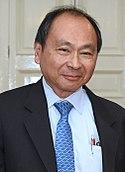Francis Fukuyama Quote
Unfortunately, the trading of political influence for money has come back in a big way in American politics, this time in a form that is perfectly legal and much harder to eradicate. Criminalized bribery is narrowly defined in American law as a transaction in which a politician and a private party explicitly agree upon a specific quid pro quo exchange. What is not covered by the law is what biologists call reciprocal altruism, or what an anthropologist might label a gift exchange. In a relationship of reciprocal altruism, one person confers a benefit on another with no explicit expectation that it will immediately buy a return favor, unlike an impersonal market transaction.
Francis Fukuyama
Unfortunately, the trading of political influence for money has come back in a big way in American politics, this time in a form that is perfectly legal and much harder to eradicate. Criminalized bribery is narrowly defined in American law as a transaction in which a politician and a private party explicitly agree upon a specific quid pro quo exchange. What is not covered by the law is what biologists call reciprocal altruism, or what an anthropologist might label a gift exchange. In a relationship of reciprocal altruism, one person confers a benefit on another with no explicit expectation that it will immediately buy a return favor, unlike an impersonal market transaction.
Related Quotes
About Francis Fukuyama
Francis Yoshihiro Fukuyama (; born October 27, 1952) is an American political scientist, political economist, international relations scholar, and writer.
Fukuyama is best known for his book The End of History and the Last Man (1992), which argues that the worldwide spread of liberal democracies and free-market capitalism of the West and its lifestyle may signal the end point of humanity's sociocultural evolution and political struggle and become the final form of human government, an assessment met with numerous and substantial criticisms. In his subsequent book Trust: Social Virtues and Creation of Prosperity (1995), he modified his earlier position to acknowledge that culture cannot be cleanly separated from economics. Fukuyama is also associated with the rise of the neoconservative movement, from which he has since distanced himself.
Fukuyama has been a senior fellow at the Freeman Spogli Institute for International Studies since July 2010 and the Mosbacher Director of the Center on Democracy, Development and the Rule of Law at Stanford University. In August 2019, he was named director of the Ford Dorsey Master's in International Policy at Stanford.
Before that, he served as a professor and director of the International Development program at the School of Advanced International Studies of Johns Hopkins University. Previously, he was Omer L. and Nancy Hirst Professor of Public Policy at the School of Public Policy at George Mason University.
He is a council member of the International Forum for Democratic Studies founded by the National Endowment for Democracy and was a member of the Political Science Department of the RAND Corporation. He is also one of the 25 leading figures on the Information and Democracy Commission launched by Reporters Without Borders. In 2024 he received the Riggs Award for Lifetime Achievement in International and Comparative Public Administration.
Fukuyama is best known for his book The End of History and the Last Man (1992), which argues that the worldwide spread of liberal democracies and free-market capitalism of the West and its lifestyle may signal the end point of humanity's sociocultural evolution and political struggle and become the final form of human government, an assessment met with numerous and substantial criticisms. In his subsequent book Trust: Social Virtues and Creation of Prosperity (1995), he modified his earlier position to acknowledge that culture cannot be cleanly separated from economics. Fukuyama is also associated with the rise of the neoconservative movement, from which he has since distanced himself.
Fukuyama has been a senior fellow at the Freeman Spogli Institute for International Studies since July 2010 and the Mosbacher Director of the Center on Democracy, Development and the Rule of Law at Stanford University. In August 2019, he was named director of the Ford Dorsey Master's in International Policy at Stanford.
Before that, he served as a professor and director of the International Development program at the School of Advanced International Studies of Johns Hopkins University. Previously, he was Omer L. and Nancy Hirst Professor of Public Policy at the School of Public Policy at George Mason University.
He is a council member of the International Forum for Democratic Studies founded by the National Endowment for Democracy and was a member of the Political Science Department of the RAND Corporation. He is also one of the 25 leading figures on the Information and Democracy Commission launched by Reporters Without Borders. In 2024 he received the Riggs Award for Lifetime Achievement in International and Comparative Public Administration.
